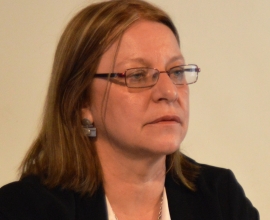Care and public policy: debates and status at the regional level
19/02/2015
PrintMaría Nieves Rico and Flavia Marco Navarro
In Latin American, responsibility for caring for household members with some degree of dependency—children, the elderly, chronic invalids, and persons with some disability—has traditionally been delegated to women under the euphemism of “the family”. In addition, women have been tasked with caring for adult men occupied in the labour market (Durán, 2003 y 2012), who benefit from the unpaid domestic work done by the women in their families. This means that a significant portion of the social protection generated in the region is resolved individually and privately, is sharply stratified and segmented—dependent on household income—and is an expression of a gender-based division of labour, one of the main factors of inequality present in our societies. In effect, social protection seeks to make a decent standard of living possible for people, basically through access to social services and a minimum income. But faced with the deficiencies of the public system of social protection, it is women, with their unpaid work, who meet the welfare and quality of life needs of their family members.
While this is nothing new; what is new is that in recent years different processes are coinciding which are drawing special attention to the need to provide a public policy response to the care needs and the inequities that exist in this area. Among these processes, which vary in nature and emphasis according to the country, the following types of phenomena stand out: a) political-cultural, associated with a questioning of the current gender order and its distribution of roles, responsibilities and values, and the resulting emancipatory processes of women; b) demographic, such as the drop in the mortality rate, increased life expectancy and the stratified drop in fertility; c) epidemiological, because chronic degenerative diseases have displaced infectious diseases as the leading causes of death and disability; d) family, linked to changes in composition and structure, especially the increasing number of single-parent households headed by women; and 3) socio-economic, closely linked to women's steady entry into the job market.
The confluence of these phenomena has revealed that the current manner of organising care of family members in Latin America is a source of social and gender inequality, and is even a factor that perpetuates poverty (ECLAC, 2009). The breadth and depth of the diagnoses on the importance of care for individual and collective welfare, and of the inequality inherent in its production, conducted in the last decade—mainly from the perspective of gender and rights—has made it possible to insert the problem of care into the region's social conversation and public debate.
Likewise, they have shown the minimal presence of the State in the satisfaction of the care needs and demands of the population, demonstrating that it is imperative that traditional public policies for social protection, education and health—whether contributive or non-contributive—be reoriented to meet the objective of greater equality, at the same time as they need to be accompanied by a “fourth pillar”: care for all and attention to persons with some degree of dependency. This responds to the conviction that the State and its public policies have an important role in the relationship established between how societies organise the care of their members and how the economic system works.
This article, in addition to presenting the status of the debate in Latin America surrounding the conceptualisation of care and the empirical evidence that underpins the new and different approaches being taken, reviews the public policies adopted in some countries in the region—particularly Bolivia, Costa Rica, Chile, Ecuador, Uruguay and Venezuela—to finalise a proposal aimed at progressing towards comprehensive national care systems.
Flavia Marco Navarro, Bolivian attorney, expert on gender studies, and consultant to international institutions and civil society organisations.
María Nieves Rico, Argentine social anthropologist. Expert on gender studies and social policy. Social Affairs Officer in ECLAC's Social Development Division.
This text was published in Las fronteras del cuidado. Agenda, derechos e infraestructura [Care Frontiers. Agenda, rights and infrastructure], Laura Pautassi and Carla Zibecchi (coordinators) Buenos Aires, Editorial Biblos ISBN: 978-987-691-148-1. Chapter 1, pages 27 to 58.
Read the full essay: Care and Public Policies_Marco and Rico

